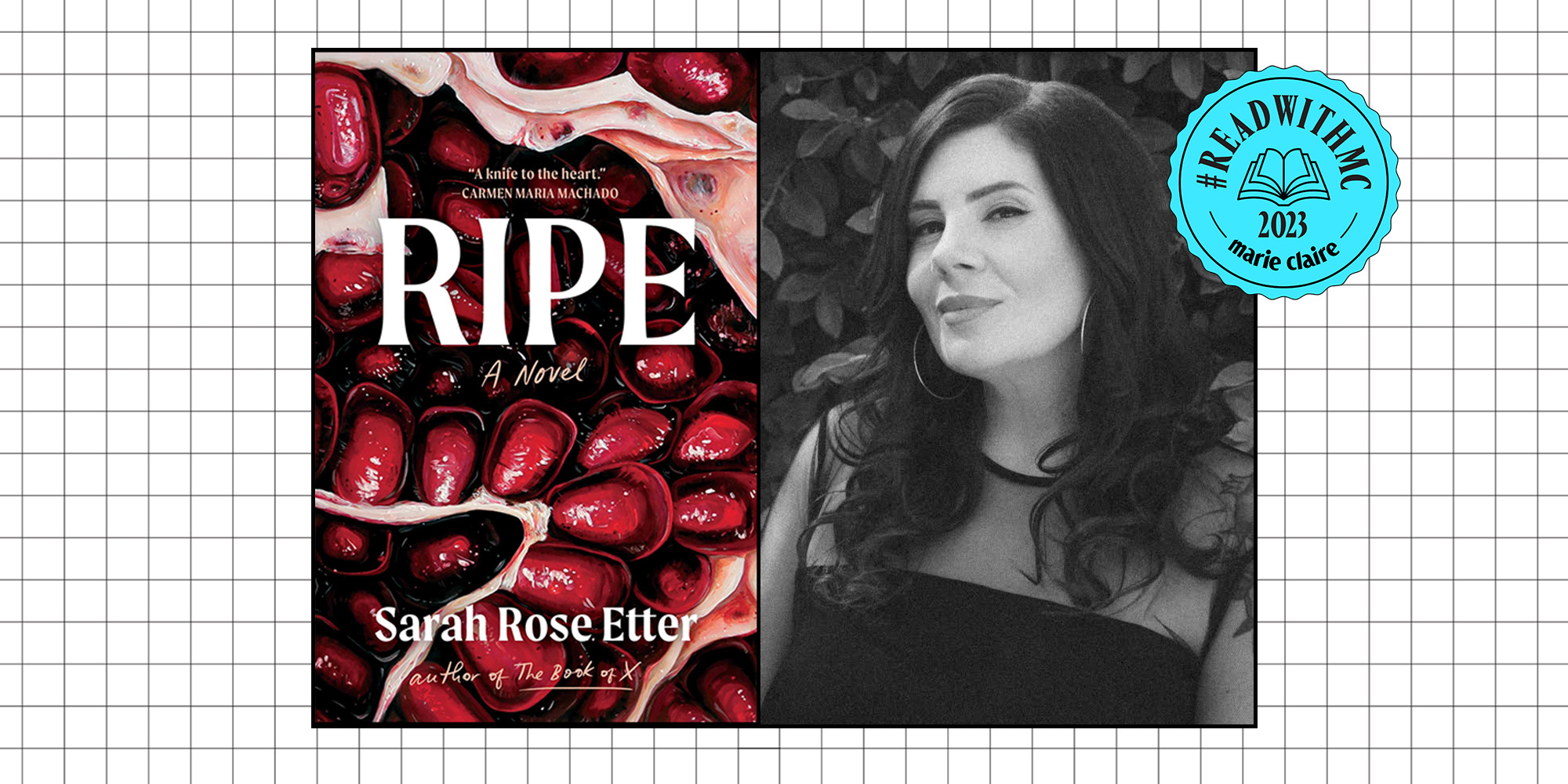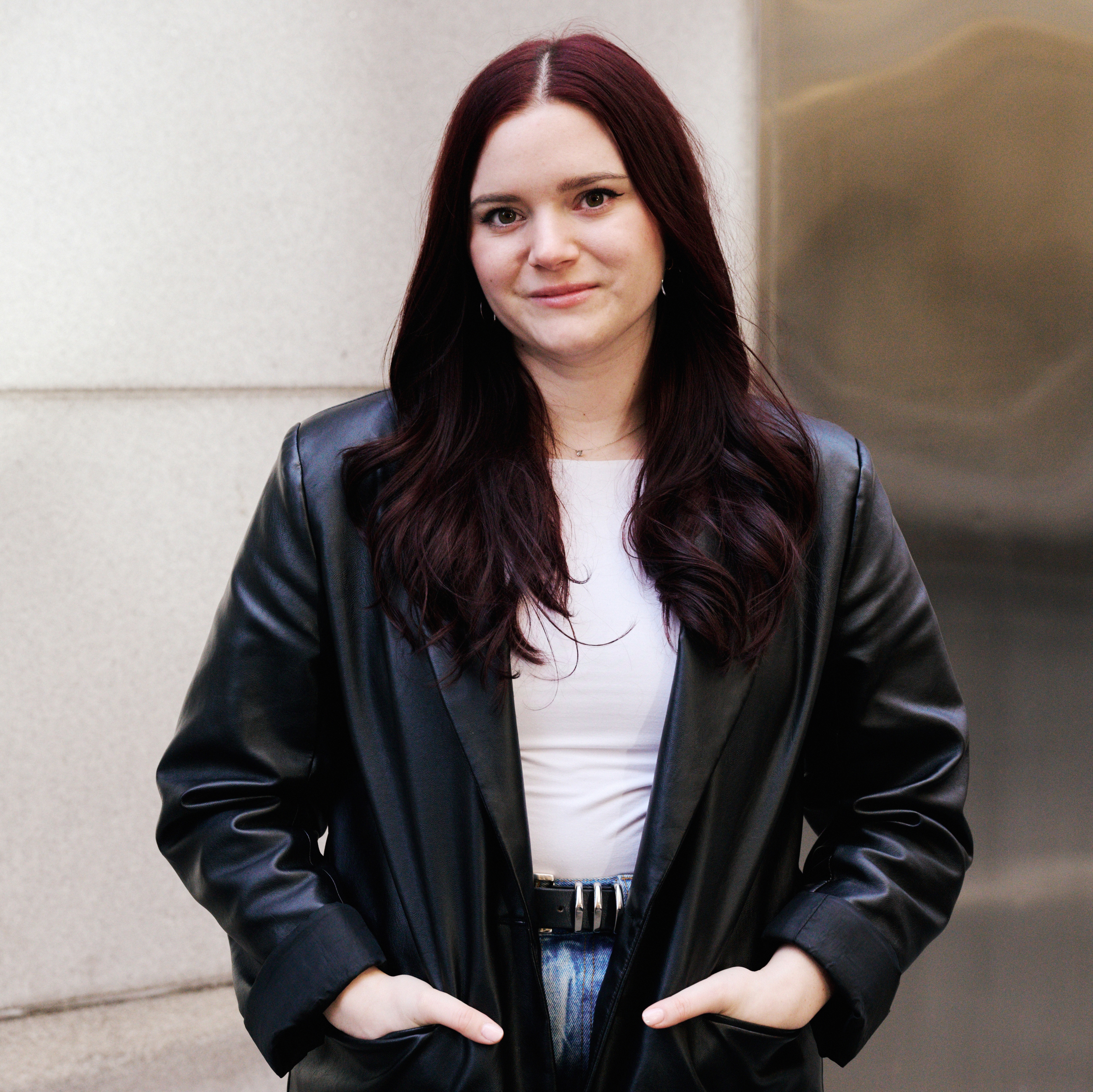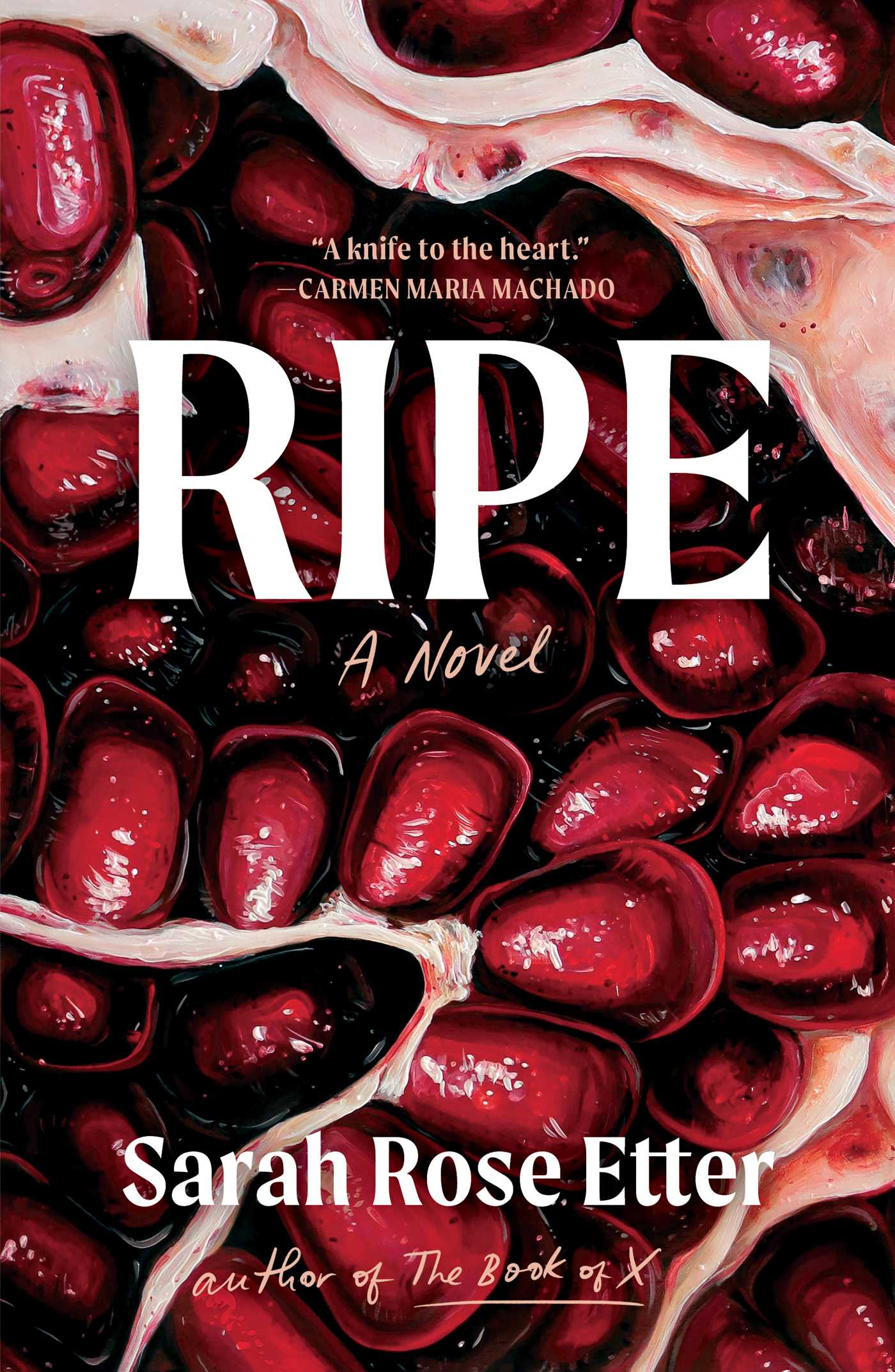'Ripe' Is Our August Book Club Pick
Read an excerpt of Sarah Rose Etter's new novel, here, then dive in with us throughout the month.


Welcome to #ReadWithMC—Marie Claire's virtual book club. It's nice to have you! In August, we're reading Sarah Rose Etter's Ripe, a wrenching story about one woman's struggle with her demanding Silicon Valley career and "black hole" depression in a capitalism-obsessed world. Read an excerpt from the book below, then find out how to participate. (You really don't have to leave your couch!)
A man shouldn’t be seen like that, all lit up. A horror that sharp stays with you. It’s a knife lodged in the heart.
A Tuesday, on the train, in the evening, after work. The train smells of: humans and ruin, bad breath, old sweat, rotten fruit. Through the dirty window, San Francisco in winter: cold sunset over glinting water, dark hills dusted with lights, the black silhouettes of palm fronds clawing like desperate fingers at the fading pastel sky.
The train is full of Believers. I’m not one of them. The Believers have wan skin and glassy eyes. They wear: wind jackets with tech logos, raw denim, canvas sneakers, sustainable ballet flats. Their white plastic earbuds override the sound of real life, their faces buried in their screens. They do not speak or make eye contact. They aren’t really here. The train is full of husks.
I act like one of them. Slow, sad music plays through my earbuds. The song makes the commute feel like a movie. With each flash of scenery, the train carries me farther away from the office. Each day here presses the life out of me. On the way home, I am silent, flat, pulped.
The black hole hovers above the empty seat to my left. A dark heat emanates from its center. A metallic smell overtakes me, the scent of outer space. No one else can see the black hole. It is mine and mine alone. It always has been.
“Ma’am, I need a dollar,” a voice calls over my music.
Get exclusive access to fashion and beauty trends, hot-off-the-press celebrity news, and more.
A man stands in the aisle: faded brown suit, too old to blend in here, his dark eyes bloodshot from age or drink.
“I don’t have any cash,” I say.
“Nothing? Come on.”
The black hole expands and rotates clockwise.
“I’m really sorry.”
“Man, fuck you,” he mutters, moving on to the next husk.
As the train reaches my stop, I slide my earbuds out and into their case. I weave through the crowd on the platform: mothers pushing strollers, Believers carrying hoverboards under their arms, teenagers cursing, the blind man playing a battered violin, the melancholy notes vibrating through the belly of the station. The black hole moves alongside me, above their heads.
Outside, I walk a few blocks through the heart of the city: vendors selling food and flowers, performers strumming battered guitars with white buckets at their feet, women selling silver jewelry glinting beneath the streetlights. Then I see him.
It starts with a small crowd on the sidewalk. A fire truck and a few police cars are parked haphazardly on the street, blue and red lights flashing.
“Sir, please think this through,” a policeman says above the din of the crowd. “You don’t need to do this.”
Suddenly, an orange flickering shoots above our heads. At first, I think it is a bonfire, but a howl rips through the air and the bodies part. A tall fire blazes, and inside the flames, I make out the shape of a man waving his arms. He opens his mouth in a silent scream.
The firemen turn their extinguishers on him, blanketing his smoldering body in synthetic snow, as the pyre of him collapses on the sidewalk. The wretched scent of charred skin and hair threads through the air.
I can’t take another second. I turn away.
The walk to my apartment is a silent hallucination. I imagine the unbearable aftermath on a terrible loop: his seared skin sliding off, exposing the raw red flesh beneath. The pastel row homes of my neighborhood are gray in the dark. In the entryways of closed stores, men and women have set up their camps for the night, small temporary homes. The black hole rises up into the sky before me, a dark star.
Numb and trembling, I pull my phone from my pocket and tap the screen. It’s late across the country, but I know he will answer.
“Hey, sweetie.”
“Hey, Dad.”
“Listen, it’s too late to call like this. You know we’re sleeping already. You almost woke your mother up. Everything okay?”
The man on fire is caught in my throat. The whole scene lives there, inside my neck, smoldering. I taste smoke.
“It’s going okay,” I choke out. “Just missed you.”
“Miss you, too. Love you.”
“Love you, too.”
He hangs up and the loneliness in my chest overtakes me for a moment. I reach the front of my building, a cakelike yellow home converted into apartment units. The man who lives on the sidewalk beneath my window is sleeping.
Upstairs in my tiny apartment, I pull a small bag of cocaine from the freezer and cut out a line, then suck the powder up my nostrils. The drugs lace into my blood. I lean back on my cheap blue sofa and stare at the white ceiling. For a moment, just a moment, the man on fire is gone and there is nothing in my mind at all. For a moment, I am cold, still, a cadaver on a silver autopsy table.
But when I close my eyes, he goes up in flames again, blazing in the black of my mind. He burns bright, endlessly, his silent wail starved of oxygen.
I open my eyes and the black hole is hovering above me. It widens, dilating like a pupil.
Portals to danger, nothingness, mystery, evil, other dimensions, the unknown, the mystical void, death, the end of the world as we know it.
Physicists came to call them black holes because they were impossible to explain. There is no adequate literal phrase for black holes—they exist outside the realm of human understanding. Language fails us, so we personify the phenomena. Black holes: eat, ingest, suck, spew, devour, expand, grow. We make them familiar in order to understand them, to reduce our fear of what is beyond this life.
The black hole has been with me for as long as I can remember, a dark dot on the film of my life. When I came out of my mother, the black hole must have followed, tethered to her, just like me. The doctor must have unknowingly cut two cords that day: one red, one black.
The black hole is at its most powerful when I’m alone. When I’m around other people, it tends to stay small, shrinks down to a small point. But if the melancholy gets too great, if it rises up and overtakes me, the black hole expands no matter what.
When I am alone on my darkest days, the black hole swells, a rotating mass that blocks out the world. It smells sweet and metallic, like what astronauts report when they describe the smell of outer space: notes of welded silver, raspberries, burned meat. The scent overtakes me.
When the black hole expands, it eclipses my heart and mind, sucks all joy and light from my body. The black hole sings and holds a single note, the song of my name. It might seem like it would be easy to resist it. But it’s impossible not to hear the call into its depths. It is the siren song of the void.
Excerpted from Ripe by Sarah Rose Etter. Copyright © 2023 by Sarah Rose Etter. Excerpted with permission by Scribner, a division of Simon & Schuster, Inc.

Brooke Knappenberger is the Associate Commerce Editor at Marie Claire, where she specializes in crafting shopping stories—from sales content to buying guides that span every vertical on the site. She also oversees holiday coverage with an emphasis on gifting guides as well as Power Pick, our monthly column on the items that power the lives of MC’s editors. She also tackled shopping content as Marie Claire's Editorial Fellow prior to her role as Associate Commerce Editor.
She has over three years of experience writing on fashion, beauty, and entertainment and her work has appeared on Looper, NickiSwift, The Sun US, and Vox Magazine of Columbia, Missouri. Brooke obtained her Bachelor's Degree in Journalism from the University of Missouri’s School of Journalism with an emphasis on Magazine Editing and has a minor in Textile and Apparel Management.
